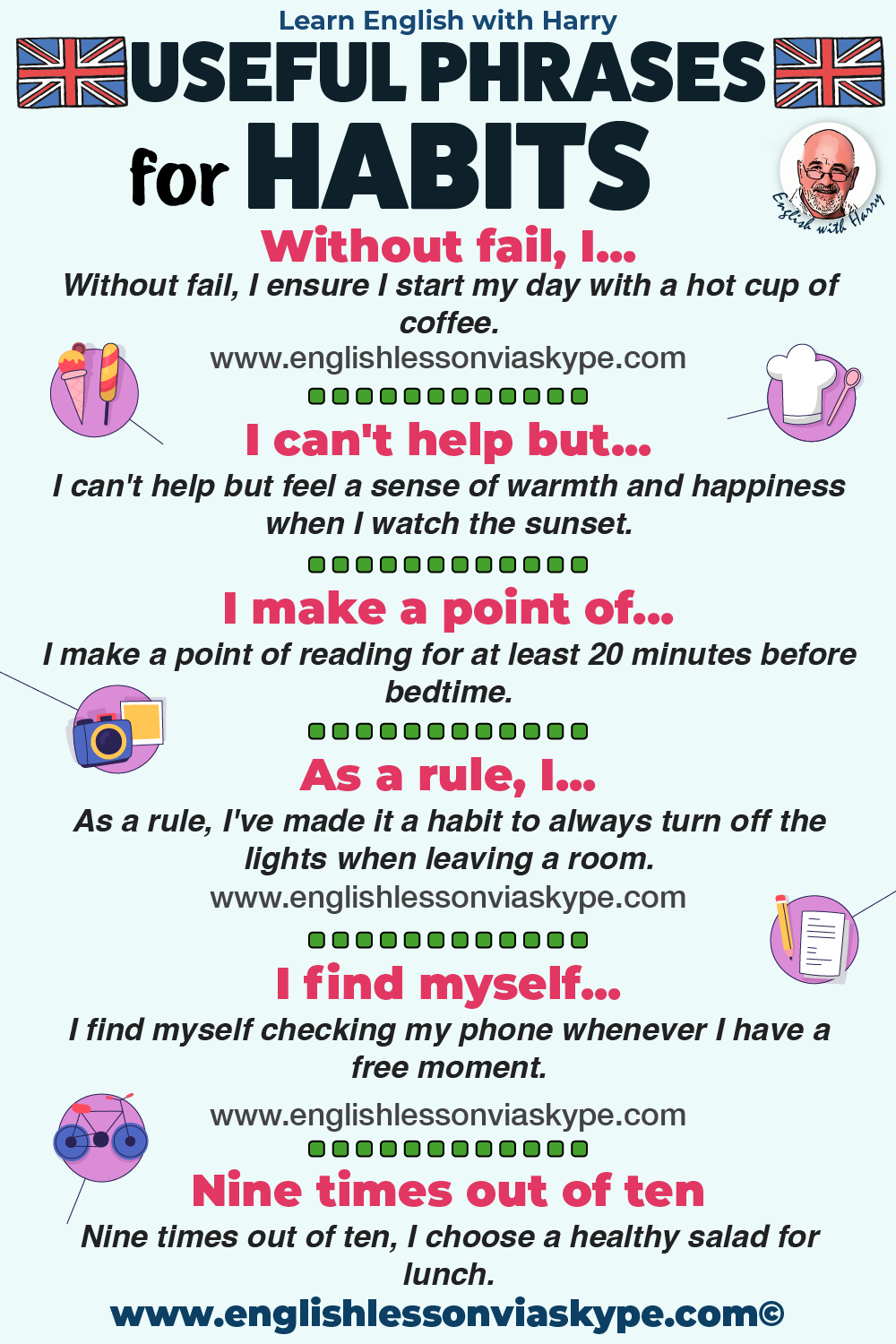Learn important phrases for talking about habits in English. I’ll teach you the phrases native speakers use in their everyday conversations.
This will help you get better at speaking English confidently.
Practice these key phrases when discussing habits in English conversations to improve your vocabulary and your overall English language skills.
Listen to the podcast Speak Better English with Harry or watch it on YouTube at Learn English with Harry. englishclass101
How to talk about habits in English
Talking About Habits In English
Harry
We’re learning phrases for talking about habits in English. We’ll explore various expressions, words, and phrases that you can use when talking about habits.
Habits are activities we regularly do, such as waking up at the same time every morning, which is a habit, having our meals at fixed times each day, another habit, and visiting parents, grandparents, or someone else regularly, whether it’s monthly or weekly.
improve english on a budget
Online English Courses from €7.99
1️⃣ How to talk about present habits:
the present simple tense
As you know, the present simple tense is used primarily for habitual actions
Examples:
Mum prepares lunch for us every day.
Dad takes us to school every day in the car.
My weekly routine includes attending a meditation class.
I practice the piano for an hour every day.
will + infinitive
This structure can be used to describe certain habits or behaviours, especially when it shows a strong tendency for someone to do something.
Examples:
He will always arrive late to our meetings; it’s become a habit.
She’ll disagree with everything you say.
She’ll always tell you what’s on her mind.
always + -ing
The phrase “always + present participle (verb + ing)” is commonly used to describe habits or actions that occur regularly and frequently.
Examples:
She’s always talking on the phone, even during class.
Adam is not a tidy boy; he’s always leaving things lying around.
His mother is always telling him to tidy up.
His father is always telling him to do his homework and mind his language.
keep (on) + -ing
The construction “keep (on) + present participle (verb + ing)” is used to describe continuous or repeated actions and habits.
Examples:
A regular mobile phone number keeps calling me every day, and I don’t answer
I keep forgetting to water the plants, and they’re dying.
They keep making the same mistakes in their work.
Talking About Habits In English

I have an inclination to/I’m inclined to
These phrases convey that a person has a natural tendency or inclination to do something regularly or repeatedly.
Examples:
I’m inclined to go a little bit too much with my introductions.
I’m inclined to talk too quickly.
Harry has an inclination to talk too quickly.
as a rule
When you use “as a rule” to talk about habits, you’re referring to something that is typically or usually done.
Examples:
As a rule, I try to get to bed before 10:30 in the evening.
As a rule, I usually get up at 6 o’clock in the morning.
As a rule, she goes to the hairdressers once a month.
As a rule, we usually have turkey and ham for Christmas dinner.
I’m prone to/I tend to
“I’m prone to” and “I tend to” are phrases we use when we want to talk about something we often do or a habit we have. It means that we have a tendency to do that particular thing regularly.
Examples:
I’m prone to overthinking situations, which can cause unnecessary stress.
He tends to arrive early for appointments as a matter of habit.
I’m prone to getting a little sick during the winter when the weather gets cold.
I tend to get a bit sick during the cold winter weather.
nine times out of ten
“Nine times out of ten” is an expression we use to talk about something that happens most of the time or is a common habit. It means that in the majority of cases or situations, a particular thing occurs.
Examples:
Nine times out of ten he comes home at six o’clock in the evening.
Nine times out of ten he’ll watch the football if it’s on the TV.
Nine times out of ten, he’ll buy her perfume for her birthday or for Christmas.
book your trial English Lesson
2️⃣ How to talk about past habits:
used to/would
We use “used to” to describe past habits or actions that were regular and habitual but are no longer true in the present.
“Would” is used to talk about past actions that were habitual or regular, especially in specific situations.
Examples:
I used to visit my grandmother every Saturday when I was young. 🟰 I would visit my grandmother every Saturday when I was young.
✅ I used to work in a bank. – this is not a habit
❌ I would work in a bank.
✅ I used to play football every Saturday with my friends.
✅ I would play football every Saturday with my friends.
I kept (on) + -ing
“Kept (on) + present participle (verb + ing)” is used to describe continuous or repeated actions or habits that persisted over time.
Examples:
He kept on reading books well into his nineties.
I kept on eating pizzas even though my doctor told me it was bad for my health.
I was always + -ing
The phrase “I was always + -ing” is typically used to describe past habits or actions that were a consistent part of your routine or behaviour. It emphasises the regularity or frequency of an action in the past.
Examples:
I was always getting into trouble with the sports teacher in school because I wanted to do it my way.
I was always reading books when I was a child.
She was always talking about her travels.
Talking About Habits In English

I was forever + -ing
The phrase “I was forever + -ing” is used to emphasise that a particular action or habit was extremely persistent, indicating that it happened very frequently or continuously. It’s often used to describe habits or behaviours that seem never to stop.
Examples:
I was forever forgetting to do my history project.
I was forever cleaning up after my messy roommate.
She was forever checking her phone during class.
He was forever complaining about the weather, no matter what season it was.
I was prone to
“I was prone to” describes a tendency or habit of consistently engaging in certain actions, behaviours, or responses. It suggests that you had a natural inclination or a likelihood to do something.
Examples:
I was prone to bad colds when I was a child.
I was prone to overthinking every decision I had to make.
She was prone to getting emotional during sad movies.
So phrases for talking about habits in English. Take some time to practice by reading and listening to them once or twice.
If you have any issues, feel free to contact me at englishlessonviaskype.com I’m more than happy to assist you and provide additional examples.
So, go ahead and practice those habits. And, as always, thank you for listening and watching. Join me again soon.
speak better English with Harry podcast- episode 455
more information
For more information on English grammar rules, English collocations and English idioms, check out the links below:
When to use ‘make’ and ‘do’ in English
You can always study English advanced level at Learning English with the BBC and British Council Learn English.





